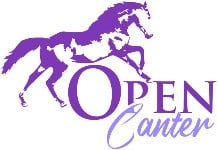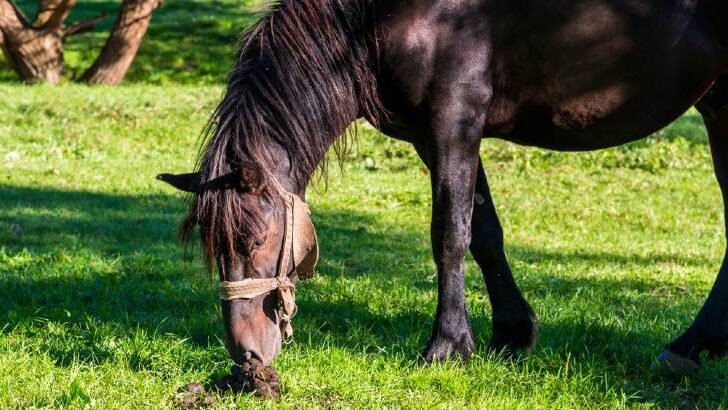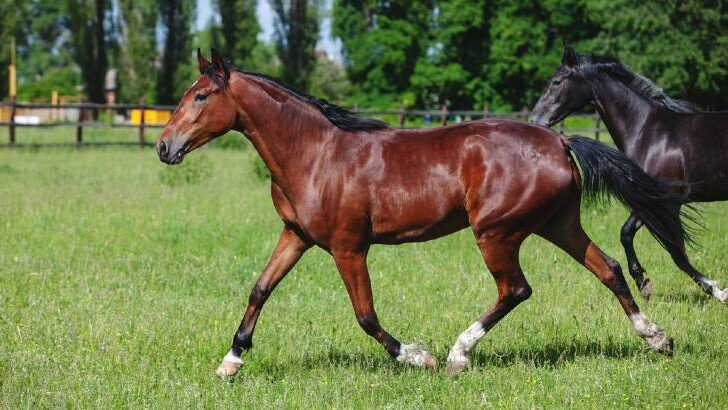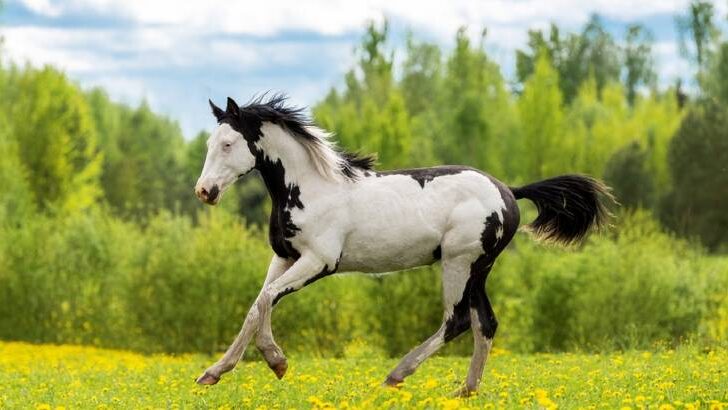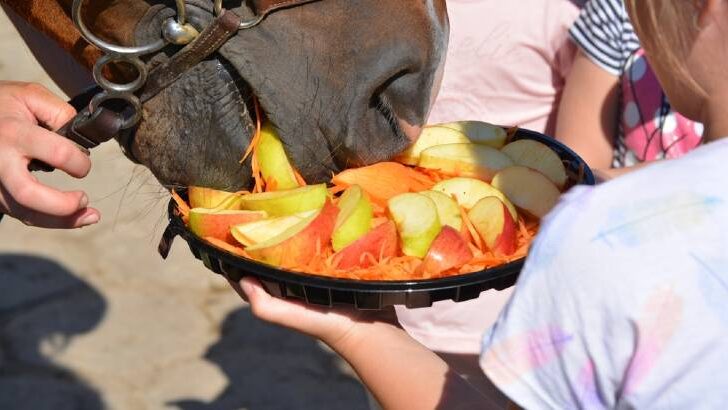Affiliate Disclaimer
As an Amazon Associate I earn from qualifying purchases. It helps me keep the website going. Thank you for your support.
Should you be worried if you see your horse eating poop? Why would he, or she, be doing this? Is it normal behavior for horses? What should you do if you see it? Can you, or should you, try and stop it? Read on to discover the answers to these questions about what, to us, is a very curious eating habit!
The correct name for ‘poop eating’ is coprophagia. It’s relatively common in many species, including horses. Whilst the occasional bit of manure eating isn’t a huge concern, it shouldn’t normally be much more than that. If you do see your horse doing it regularly, it may indicate underlying health or behavioral issues. And warrant a call to your vet.
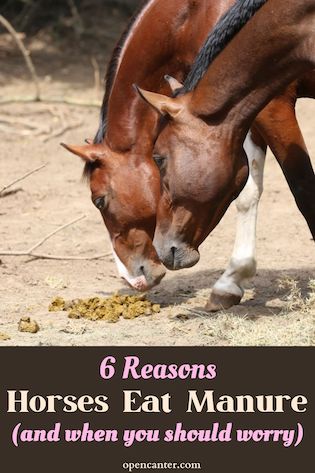
Why Do Horses Eat Poop?
Horses eat manure for a variety of reasons but most commonly because of:
- Nutritional deficiencies
- Dietary issues
- Digestive problems
- Medical disorders, and
- Boredom or habit
1) Nutrient Deficiencies – Horses Eat Manure To Get Nutrients
Have you ever wondered why animal manures are popular with gardeners? It’s not only because they provide organic matter. They also contain a range of nutrients like:
- Salt
- Phosphorus
- Calcium
- Potassium
- Magnesium
- B-group vitamins vitamin K (deficiency in this vitamin may be linked to coprophagia) and various other micronutrients. As detailed in Equine Neurology, by Furr and Reed.
How Do Nutrients Get Into Horse Poop?
When horses are fed some nutrients in excess, they poop (and pee) out what they don’t use. It’s nature’s way of ensuring their systems don’t get overloaded with excessive and harmful amounts of vitamins and minerals. Humans do it too!
Side note – not all nutrients are disposed of in this way. Some, like iron, are stored in the body. If fed in excessive quantities they can become toxic. Excessive dietary iron, for example, can result in a potentially dangerous condition called hemochromatosis or iron overload.
Many vitamins and minerals also have a synergetic relationship with other vitamins and minerals (calcium and phosphorus are well-known examples). They need to be present in a particular ratio with each other to be metabolized properly.
When they are not correctly balanced, it creates an imbalance that interferes with this metabolic ‘harmony’ that may result in one or more of the nutrients not being utilized. In most instances, the body subsequently gets rid of unused nutrients in feces or urine. And they end up on your veggie or rose garden! Or fertilizing your horse paddocks.
How Is This Relevant To Your Horse Eating Poop?
It’s relevant because it is thought that horses eat manure to obtain nutrients they may be lacking in their diet. The exact nutrients, and how much of them are in the manure, will vary depending on the diet and health of the horse who produced it.
2) Dietary Issues – Horses Can Eat Manure For A Range Of Basic Dietary Reasons
Horses evolved to spend around 18-20 hours a day foraging and eating bulk roughage. It’s what their digestive system is designed to do. Domestication has changed this, particularly in modern times. As a result, we tend to see a lot more dietary problems that result in increased incidents of habits like coprophagia.
Some common dietary issues that may result in manure eating are:
Your Horse May Not Be Getting Enough Forage
If your horse isn’t getting enough fiber to eat (hay, chaff, pasture) it may eat poop to try and make up the shortfall.
As a rule of thumb, horses should eat around 1 – 2% of their body weight as bulk fiber each day. For a 1000lb or 500kg horse that means they need a MINIMUM of 10 lbs or 5kgs of hay and/or other forages daily. Preferably more. In fact – the more fiber you can feed your horse, the better off they’ll be (and the less likely to eat poop as well).
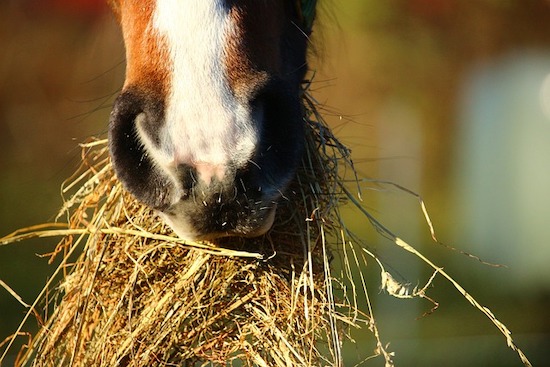
Your Horse May Not Be Getting Enough Food
If your horse isn’t getting enough to eat it may eat poop (or its bedding) because it’s hungry! The book Horse Behavior points out that if horses aren’t getting enough to eat, they will often eat poop, particularly old poop. Free-roaming mares and foals for example have been seen eating stallion piles when grazing is scarce.
Horses of the weight mentioned above need AT LEAST 20 lbs or 10kgs of food per day all up, including fiber. That’s just for maintenance. Depending on the breed and individual metabolism, some need more than this. If they’re working, pregnant, or lactating they also need more.
Your Horse May Be Going Too Long Between Feeds
You may not be feeding your horse often enough or leaving it with enough food to last until the next feed.
Horses are grazers, which means they’re supposed to eat continuously for most of the day. Little but often in other words. Those with access to 24/7 grazing rarely go more than 3 hours at a time without eating.
Horses also have small stomachs relative to their size so food passes through fairly quickly. If it isn’t being replaced regularly, stomach acid can cause problems like gastric ulcers. Also, just like us, their blood glucose levels can drop when they go too long between feeds.
So, you may notice your horse eating poop simply because it’s hungry, or its blood levels of glucose are low.
Is Your Horse Getting Too Much Starch?
Horses who get a lot of starchy grains like oats, barley, and corn (maize) have a higher tendency to eat poop than those who don’t [source]. So if you are feeding more of these grains than you should, this could be why you’re seeing your horse eating poop.
Horses possibly eat manure on these types of diets because they aren’t getting enough bulk fiber in their diets (so are hungry). It may also be because the high levels of starch have altered their gut microbiome so they eat manure in an attempt to normalize and rebalance it.
3. Digestive Problems – Your Horse May Eat Poop Because They Have Digestive Issues
Dietary issues and digestive problems go together. So – if you’re not feeding your horse correctly, this will lead to digestive problems, such as altered hindgut microflora, that may result in manure eating.
Your Horse May Have Unbalanced Hindgut Microflora
If your horse does have an unbalanced hindgut microbiome, it may exhibit manure-eating tendencies.
Most of the fiber in your horse’s diet is digested in its hindgut where it has a huge population of digestive microflora. A percentage of these pass out naturally in their manure. This is not a problem in healthy horses because they can manufacture more to replace them.
However – horses with an unbalanced microbiome may not be able to do this naturally (depending on why it’s unbalanced) so will eat manure to try and rectify the problem. Vets also sometimes drench horses with a liquid solution of manure from a healthy horse to help re-establish good gut health.
In the same way, young foals will eat their mother’s manure at some point during their first few weeks of life. They do it to populate their own hindgut with intestinal flora they aren’t born with. Incidentally, this is why it’s important to ensure the mare is wormed thoroughly just prior to foaling! If she isn’t, the foal will ingest any eggs that may be in her manure.
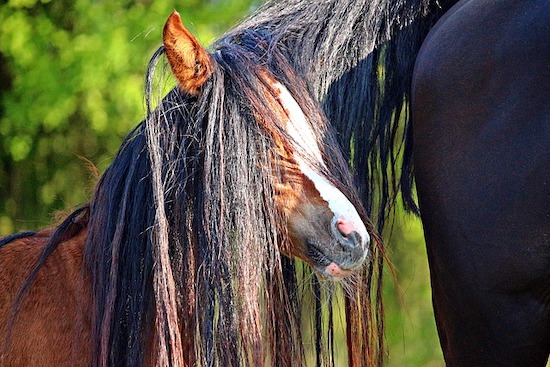
Why Would Your Horse Have Unbalanced Hindgut Flora?
There are many reasons why a horse’s hindgut flora might get out of whack, including:
- Sudden diet changes
- Stress
- Illnesses such as colic and inflammatory bowel disease
- Age
- Intestinal parasites
- Antibiotics
4) Medical Conditions – Certain Health Disorders Can Contribute To Your Horse Eating Poop
Horses may eat manure to try and obtain the nutrients they need to help them cope with certain disorders.
According to some research, horses with some types of medical conditions show a greater tendency to eat manure. Equine motor neuron disease (EMND), a condition typically caused by chronic long-term vitamin E deficiency, is one example [source].
As mentioned above – prolonged use of antibiotics, colic, and conditions like inflammatory bowel disease (IBD) can also bring on a poop-munching frenzy if they upset the delicate balance of hindgut flora that your horse needs to stay healthy.
Fortunately, conditions like EMND and IBD are relatively rare!
5. Boredom – Your Horse May Develop A Coprophagia Habit Simply Because It’s Bored
Boredom can cause horses to develop a lot of bad habits like cribbing and windsucking, and eating poop (and bedding).
Is It Bad for Horses to Eat Manure?
As an occasional behavior, eating poop is not necessarily detrimental to your horse. However, if it is chronic, or acute, there will be an underlying reason. In this case, you’ll need to talk to your vet.
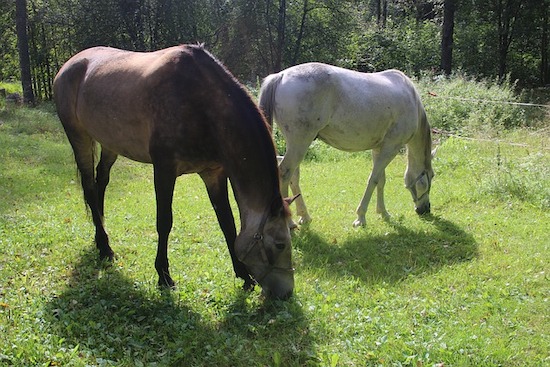
Should You Stop Your Horse Eating Poop?
Eating manure is certainly not a desirable habit to encourage in adult horses because it can:
- Infect them with parasites
- Lead to bacterial infections, and
- Spread bacterial infections
So – yes. You probably should try and stop your horse from eating poop on more than the odd occasion…
How to Stop Your Horse Eating Poop
Stopping your horse from eating poop is a case of identifying the causes and then addressing those. Usually, though it will come down to ensuring you are addressing the following 6 areas:
1) Feeding Enough Bulk Fibre
Ensure the amount of hay and forage in the diet is equivalent by dry weight to 1 – 2% of their body weight and don’t forget to factor in whatever work they’re doing.
2) Feeding Enough Period
Make sure you’re feeding at least 1.5 – 2% (dry weight) of their body weight in food in total per day (and more if they’re working, pregnant, or feeding a foal)
3) Feeding Often Enough
Feed smaller feeds more often, increase access to grazing, or provide hay in something like a slow-feeder hay net.
4) Feeding A Balanced Diet And Implementing Changes Slowly
Consider getting the diet professionally analyzed to identify any nutritional issues that may be contributing to manure eating, such as too much starch, imbalances in mineral ratios, or inadequate intake of essential nutrients.
Introduce any changes to their diet slowly and gradually.
5) Addressing Any Health Issues
Get into the habit of doing regular fecal counts and implement a tailored worming regime accordingly Keep an eye on their manure quality because it’s a good indicator of their internal health. If you notice persistent abnormalities (diarrhea, hard dry balls, sand, less than usual, etc) talk to your vet.
6) Addressing Behavioural Problems
If it’s likely caused by behavioral issues such as boredom, consider more turnout time or using a slow feed hay net for their hay. Try and increase their exercise. Look into things that will keep them mentally stimulated, like toys.
Final Thoughts
If you notice your horse eating poop (coprophagia) occasionally it’s probably not a cause for alarm. However, if it’s persistent (chronic) or they suddenly start gorging on poop (acute) that definitely warrants a talk to your vet. Stopping it is a combination of identifying why they’re doing it. Then taking steps to address those reasons.
